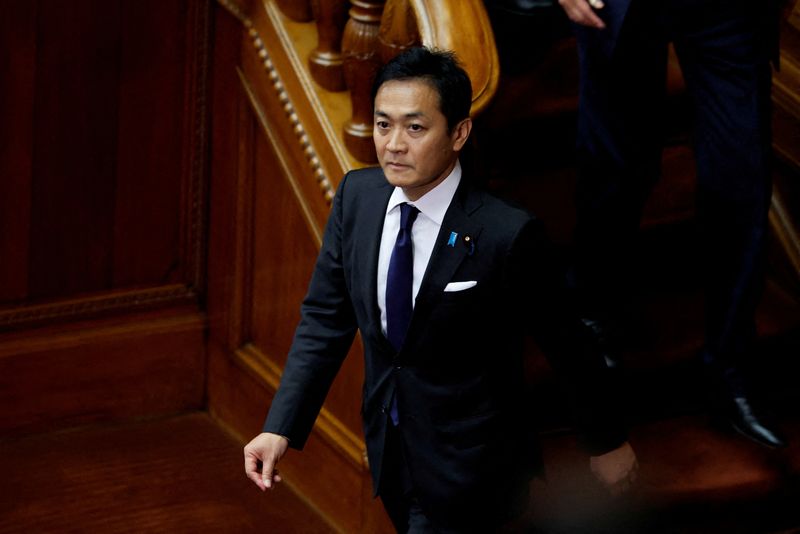By Makiko Yamazaki and John Geddie
TOKYO (Reuters) - Yuichiro Tamaki, the leader of a small opposition party now able to wield outsized political influence, had long puzzled over how best to revive a moribund deflation-entrapped Japanese economy.
A former finance ministry bureaucrat, his early career was steeped in fiscal conservatism but even so, he became convinced that the easy 'Abenomics' fiscal and monetary stimulus policies favoured by Japan's leaders for around a decade did not go far enough.
His lightbulb moment came upon reading a 2016 speech by then Federal Reserve Chair Janet Yellen on running a "high-pressure" economy - one where demand outstrips supply in a tight labour market to spur growth and dispel entrenched economic gloom.
"I felt like something that had been hazy in my head had been cleared," Tamaki said in a 2021 blog post praising Yellen's proposals.
Tamaki, 55, now advocates for aggressive tax relief and welfare spending. As leader of the Democratic Party for the People (DPP), he could well have opportunities to put his theories to the test.
An Oct. 27 election left the ruling Liberal Democratic Party (LDP) and its coalition partner Komeito leading a fragile minority. Prime Minister Shigeru Ishiba's administration has been seeking cooperation with the DPP, especially over economic measures and Tamaki has said he may support coalition policies where they can find common ground.
But while some economists say Tamaki's plans could boost a still fragile economy, others are wary they could swell Japan's mountain of debt, unsettle investors and complicate the central bank's efforts to wean the country off decades of massive monetary stimulus.
UNORTHODOX APPROACH
Hailing from a small, rural town in western Japan, Tamaki studied law at the University of Tokyo before embarking on a 13-year stint as a career bureaucrat in 1993 just after the bursting of the country's real estate and stock bubble.
Despite having climbed the ladder to land a job in LDP Prime Minister Junichiro Koizumi's cabinet office, Tamaki decided to join the opposition and run for office in the 2005 election.
He lost, spent four years in political wilderness, but then returned to clinch a seat in 2009 when the opposition ousted the LDP for only the second time in Japan's post-war era.
Asked why he rejected fiscal conservatism, Tamaki told a press conference on Friday he had seen first-hand how those policies had failed to avert a near 30-year slide in real wages.
Tamaki is not the first to argue for fiscal largesse to revive Japan's economy - which some predicted half a century ago might overtake the United States to become the world's biggest but last year slipped below Germany into fourth place.
Abenomics, named after late premier Shinzo Abe who led the LDP back to power in 2012, increased money supply, boosted government spending and sought corporate governance reform. But it didn't get the job done, Tamaki says, as demand was stifled through successive hikes in the consumption tax.
Tamaki's vision, such as raising the basic tax-free income allowance, temporarily halving the country's consumption tax and lowering the gasoline tax, has won significant support among younger voters.
He has also said the Bank of Japan should pause its efforts to raise interest rates for at least six months.
While his rise to prominence was blemished this week by revelations of an extra-marital affair, his party has swung behind him with support.
WHO PAYS?
As the ruling coalition discusses the DPP's policy proposals, the finance ministry, in apparent protest, has estimated Tamaki's proposed income tax threshold hike could trigger a drop in tax revenue of more than 7 trillion yen ($46 billion).
But Tamaki has been unfazed, pointing out that inflation in Japan remains low compared to other developed economies and that it has room to spend given bumper tax revenues in recent years.
Takuya Hoshino, chief economist at Dai-ichi Life Research Institute, said Tamaki's policies could be effective in boosting long-stagnant consumption.
But other economists say his policies risk stoking inflation and expanding public debt, which already stands at more than twice the size of Japan's economy.

The policies are "short-sighted" and could unnerve bond market investors at a time when the central bank is trying to run down its holdings of government bonds bought via its emergency quantitative easing programme, said Norihiro Yamaguchi, senior economist at Oxford Economics in Tokyo.
"This is like a huge fiscal burden and in the end, someone has to pay," he said.